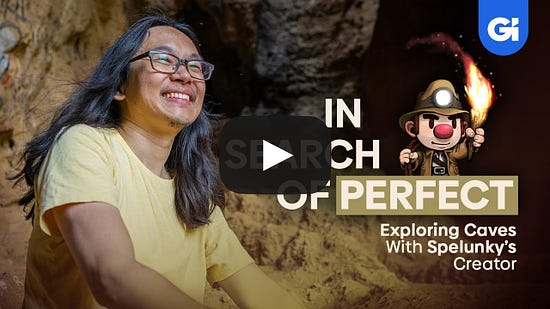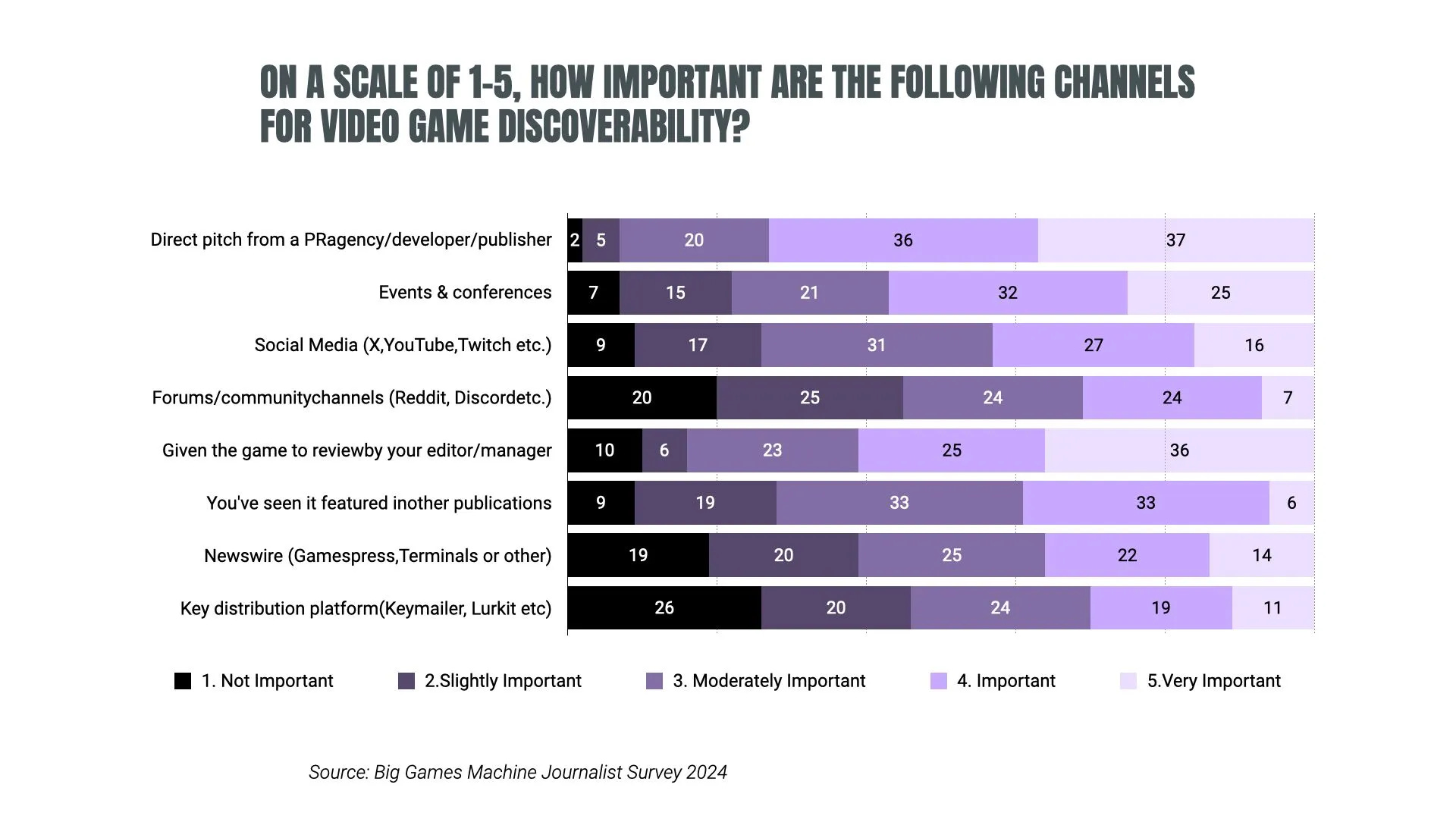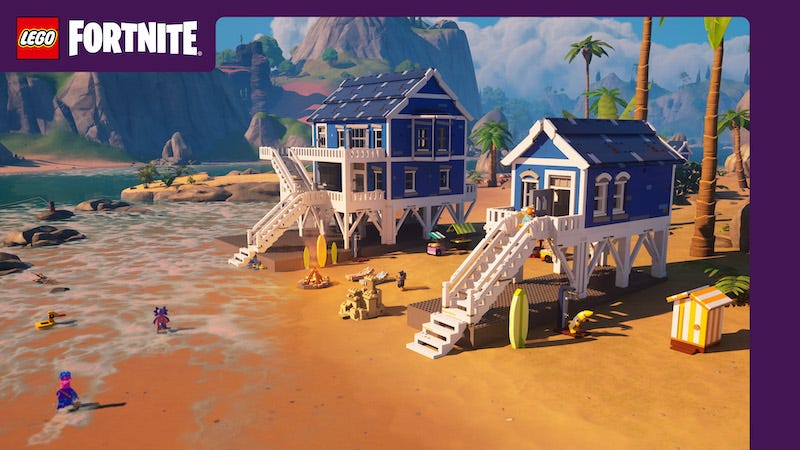What Electronic Arts thinks about the future of game discoveryAlso: intriguing game journo surveys, discovery news & more..[The GameDiscoverCo game discovery newsletter is written by ‘how people find your game’ expert & company founder Simon Carless, and is a regular look at how people discover and buy video games in the 2020s.] We’re back! It’s the week before GDC 2024, also known as ‘how many meetings can you cram into a single day before you actually turn into a meeting?’ - we wish all you business types much luck. (Also: timezone confusion fans, remember the U.S. did its daylight savings time change already but Europe didn’t.) And we’re not afraid to keep bringing the content, thanks to our small but perfectly formed team of coders and data experts. So we’ll keep on keeping on - we’re kicking off this time with a look at Electronic Arts’ views on the discovery landscape. [REMINDER: you can support GameDiscoverCo by subscribing to GDCo Plus now. You get full access to super-detailed Steam data for unreleased & released games, weekly PC/console sales research, Discord access, seven detailed game discovery eBooks - & lots more. ] What EA’s CEO thinks of game discovery’s future
Electronic Arts has a storied history in the game biz, having been founded in the early ‘80s as a ‘highlight the game developer as a creator’-centric company. (In fact, I have that classic 1983 ‘We See Farther’ ad framed in my office, above my monitor.) And forty+ years later, EA is still alive and kicking, if a tad more corporate - with a $36.7b market cap, a stable post-pandemic share price that’s 10x over the last decade. With a few big, ‘recurring yearly revenue’ brands to the fore, it’s the opposite of the scattershot ‘just buy everyone’ approach Embracer seems to have tried. So it was fascinating to see EA’s CEO Andrew Wilson appear at the influential Morgan Stanley Technology, Media & Telecom Conference last week. His full remarks are here [.PDF], though his target demographic for this talk was shareholders & analysts, not us. But that’s precisely why his broader views - rarely aired this aspirationally in earnings calls - are so interesting to look at. And here’s some of the game discovery takeaways we had from Wilson’s comments:
Beyond this broadening, something that also got games press discussion was Wilson’s discussion on artificial intelligence - particularly since EA’s timing is rough, if you’re one of the hundreds they laid off recently. But it seems like this is standard ‘we’re going to talk about AI to juice the stock price’ fare, rather than a big strategy shift. Notes here:
So we’re talking more personalization, more user-generated content (like the Overwolf deal with The Sims 4), and more ‘you stay on our game platform forever and get new content all the time’. And Wilson concludes: “[If] I fast forward on a 10-year time horizon, there's probably going to be a dozen to two dozen massive online communities in the world… I think we, as a company, are going to have five or six of them.” Well, bad news here - that’s what the other big companies in the space want, too - stable, repeatable ‘games as a platform’ revenue. (See: Sony’s pitch in recent years.) And at the very same conference, Warner Bros’ games boss J.B. Perrette, fresh from the Hogwarts Legacy win and the Suicide Squad loss, has very much the same view. Per SeekingAlpha, Perrette says: “Our business, historically, there has been very AAA console-based… that's a great business when you have a hit like [Hogwarts Legacy]. It makes the year look amazing… When you don't have a release or… have disappointments as we just released Suicide Squad this quarter, which was not as strong, it just makes it very volatile.” So what’s the answer? Besides expanding into mobile and F2P for Warner Bros, it’s: “How do we develop a game around, for example, Hogwarts Legacy or Harry Potter that is a live service, where people can continue to live and work and build and play in that world on an ongoing basis?” (OK, this could be a viable franchise choice - four Butterbeers, plz!) It shouldn’t be a surprise that Warner wants GTA Online, but for Hogwarts. But it’s just not that easy to build from scratch and get everyone’s friend groups on board. Everyone wants it, but there’s only ‘a couple of dozen’ seats at the table. Therefore, to sinisterly quote a Paul Thomas Anderson movie title in conclusion, ‘there will be blood.’ Heads up: GDCo’s newsletter now taking sponsors
The GameDiscoverCo newsletter is approaching its 5th birthday (!) in July. And now we’re just about to hit the 25,000 free subscriber milestone, and have about 20,000 opens & views of most newsletters, we are at a scale where we can offer sponsorships. We’ve set up a page on Passionfroot where you can look at examples, transparently see pricing, and request to book with us. Our B2B audience: “Business & tool decision-makers at major game companies [and platforms, VCs, etc]. (And plenty of indies!)” So if you supply services to that market, we’d love to hear from you. FYI for readers - we’ll be running a maximum of one sponsor message per newsletter, in this ‘between A and B story’ position, and roughly this length. It’s kicking off next week… What’s up with game journalists in 2024? This…So we’re indebted to the folks at marketing agency Big Games Machine for doing a giant survey of ‘trad’ video game journalists - over 150 of them, including freelancers & full-timers for IGN, Game Informer, Eurogamer, PC Gamer, BBC, Kotaku, GameSpot & more. This survey - which is excellent and you should read in depth - is a ‘state of their business’ overview. But it also has some very useful data - such as the above chart - on how video game writers discover content to write about. Quoting from their executive summary directly, here’s some top points:
From GameDiscoverCo’s perspective, what we’ve noticed is a shift to guides and SEO-friendly content in the game writing space, as video-led coverage from YouTube and Twitch has overwhelmingly taken over the ‘most important for game discovery’ crown. Part of the reason for this is simple: websites are not daily ‘appointment reading’ for most gamers. But getting picked up by trad editorial outlets can still be a significant boost - both mentally, and if you can get interest in volume. And relatedly, Ryan Rigney’s latest newsletter muses on the role of game media, suggesting that it’s the ‘zero-click’ view that is sometimes more important than the article: “If you look at the way news and conversation flow together on social media, a big chunk of it could be summarized as reactions to headlines.. not… reactions to article content.” So there’s still tactics for boosting your game’s interest through conventional writing, even if ‘optimizing for Google search results’ is tending to skew everything. (Read this look at low-quality ‘product recommendations’ using well-known IP like Better Homes & Gardens, if you want to be slightly depressed re: search ‘warping’ the web.) The game discovery & platform news round-up…
And it’s Monday morning, and we have *covers eyes*, uh, 23 different links to round up (or push to Wednesday!) around game discovery platforms & news. Let’s do it:
Finally, we love Spelunky creator Derek Yu - heck, his ‘making of’ eBook is one of our Plus-exclusive perks. So we were excited to spot this older - but slightly unheralded - Game Informer video mini-doc, where he talks design while… actually spelunking?  [We’re GameDiscoverCo, an agency based around one simple issue: how do players find, buy and enjoy your PC or console game? We run the newsletter you’re reading, and provide consulting services for publishers, funds, and other smart game industry folks.] You're currently a free subscriber to The GameDiscoverCo newsletter. For the full experience, upgrade your subscription. |
- Blogger Comment
- Facebook Comment
Subscribe to:
Post Comments
(
Atom
)





0 comments:
Post a Comment